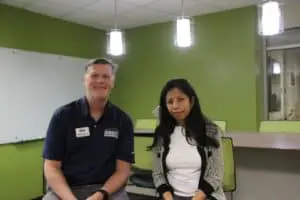What happens when the worlds of science and business collide?
ThNA Biosciences of Hillsborough County
 Dr. Eva Samal has a passion for molecular biology. She has spent the last 14 years in multiple settings exploring the relationship between a unique class of molecules, specifically small ribonucleic acids (RNAs) and diseases such as cancer, Alzheimer’s, autism and diabetes.
Dr. Eva Samal has a passion for molecular biology. She has spent the last 14 years in multiple settings exploring the relationship between a unique class of molecules, specifically small ribonucleic acids (RNAs) and diseases such as cancer, Alzheimer’s, autism and diabetes.
More importantly, she devised a high-throughput platform to identify disease-enriched proteins that can be used to develop life-saving drugs. This technology can reduce the time needed to bring a new drug to market by vastly shortening the target discovery period from 20 years to two years.
This break-through led Samal to launch ThNA BioSciences, a small biotech start-up that focuses on disease-dysregulated small RNAs that can be used like bait on a fishing hook to identify disease-associated biomarkers for diagnostics and therapeutics.
For the layman, she explains that RNAs are intermediates of a fraction of the unique DNA sequence inherited from our parents. Many of the RNA molecules are converted into proteins in the body. For example, skin or eye color are manifestations of levels of protein in the body. It is a special class of RNAs known as small RNAs that regulate the levels of protein expression. They perform immensely important functions such as regulating heart rhythm and keeping cells in check from cancer.
“The value of these small RNAs became very evident once we were able to develop the technology to use these common small RNA molecules as a decoy to capture disease biomarkers”, Samal said. She emphasized overcoming the insurmountable hurdle of identifying those one-of-a-kind one or two molecules common to every solid cancer tested to date as a major milestone in combination with her high-throughput drug target discovery platform as strong foundations for her startup.
ThNA has since additionally identified “unifying” small RNAs for Alzheimer’s disease, autism and diabetes.
All of this time in a laboratory has left her little time to study the intricacies of owning a business. This motivated her to seek the help of the Florida SBDC at University of South Florida.
“SBDC has made a tremendous impact in helping me set up the business,” Samal said. “I started working with Mr. Lairmore even before I had established a company. He walked me through the process of setting up the company step by step.”
Mitch Lairmore, a business consultant at the Florida SBDC at USF, and Karen Krymski, a Florida PTAC at USF consultant, have helped ThNA BioSciences with a variety of tasks, such as creating a business plan, developing a marketing strategy and applying for an SBIR grant.
“We’ve applied for a grant after getting very good feedback from the program director and we have been short-listed for every pitch we have participated in,” she said.
Working with the Florida SBDC at USF has also allowed the business to gain more exposure. “We were among the youngest companies to make it to BioFlorida which is amazing because our company had only been in existence for three months when that happened. We were also a semi-finalist at USF’s B.E.A.T.”
“ThNA’s founding idea was also a finalist for the Pfizer-IIT Innovation Challenge, so, we have definitely gained exposition time with SBDC’s detailed feedback and input.”
She encourages other small business owners to be proactive in seeking out the help of the Florida SBDC at USF before their business is even begins. Though she has had a very successful start, she said she will continue to seek the advice of the Florida SBDC at USF, specifically with regards to attracting funding opportunities.
“We are actively soliciting the help of SBDC to reach out to potential investors or even private citizens who might be interested in making a difference in helping us discover these sui generis disease molecules in the areas of cancer, Alzheimer’s, autism and diabetes,” she said.




